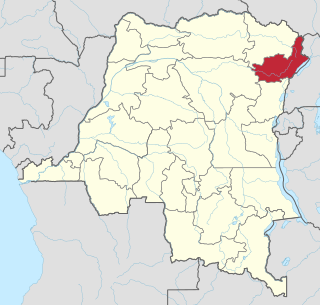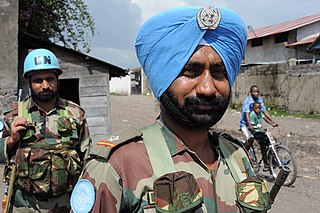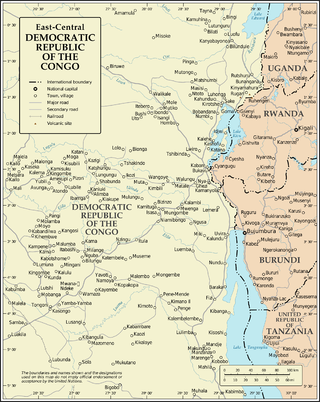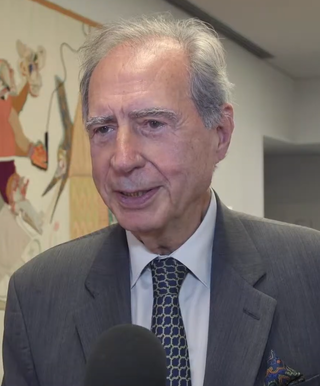
The United Nations Organization Stabilization Mission in the Democratic Republic of the Congo, or MONUSCO, is a United Nations peacekeeping force in the Democratic Republic of the Congo (DRC). A planned withdrawal from the country is currently on indefinite hold due to the unstable security situation.

Operation Artemis, formally European Union Force Democratic Republic of the Congo (EUFOR), was a short-term European Union-led UN-authorised military mission to the Democratic Republic of the Congo in 2003, during the Ituri conflict. ARTEMIS is considered the first military operation led by the EU, the first autonomous EU operation, the first rapid response mission of the EU, first operation outside Europe, first operation applying the principle of the framework nation and first example of "relay operation", conducted in cooperation between the EU and the United Nations. The deployment of EUFOR troops quickly decreased the conflict's intensity. It marked the first autonomous EU military mission outside Europe and an important milestone in development of the European Security and Defence Policy.
The Lusaka Ceasefire Agreement attempted to end the Second Congo War through a ceasefire, release of prisoners of war, and the deployment of an international peacekeeping force under the auspices of the United Nations. The heads of state of Angola, the Democratic Republic of the Congo, Namibia, Rwanda, Uganda, Zambia, and Zimbabwe signed the agreement in Lusaka, Zambia on July 10, 1999.
United Nations Security Council Resolution 163, adopted on June 9, 1961, after General Assembly Resolution 1603 declaring Angola a Non-Self-Governing Territory the Council reaffirmed that resolution calling on Portugal to act in accordance with the terms. The Council called upon the Portuguese to desist from repressive measures and to extend every facility to the Sub-Committee on the Situation in Angola, appointed under the terms of the GA resolution, as well as expressing its hope that a peaceful solution will be found and requested that the Sub-Committee report to the Council and GA as soon as possible.
United Nations Security Council Resolution 199, adopted on December 30, 1964, requested that all States refrain from intervening in the domestic affairs of the Congo and appealed for a cease-fire there. After applauding the Organization for African Unity the Council called on States to assist it in achieving its objectives in the Democratic Republic of the Congo.
United Nations Security Council Resolution 241, adopted unanimously on November 15, 1967, after reaffirming past resolutions on the topic, the Council condemned any act of interference in the internal affairs of the Democratic Republic of the Congo, in particular the failure of Portugal to prevent mercenaries from using its colony in Angola as a base of operations for armed attacks against the DR Congo. The Council called upon Portugal to put and immediate end to this and called upon all countries receiving mercenaries who had participated in the attacks against the DR Congo to take appropriate measures to prevent them from renewing their activities against any state.

The Kivu conflict is an umbrella term for a series of protracted armed conflicts in the North Kivu and South Kivu provinces in the eastern Democratic Republic of the Congo which have occurred since the end of the Second Congo War. Including neighboring Ituri province, there are more than 120 different armed groups active in the eastern Democratic Republic of Congo. Currently, some of the most active rebel groups include the Allied Democratic Forces, the Cooperative for the Development of the Congo, the March 23 Movement, and many local Mai Mai militias. In addition to rebel groups and the governmental FARDC troops, a number of national and international organizations have intervened militarily in the conflict, including the United Nations force known as MONUSCO, and an East African Community regional force.

Democratic Republic of the Congo–United States relations are the international relations between the Democratic Republic of the Congo and the United States of America.

United Nations Security Council resolution 1316, adopted unanimously on 23 August 2000, after recalling resolutions 1273 (1999), 1291 (2000) and 1304 (2000) on situation in the Democratic Republic of the Congo, the Council extended the mandate of the United Nations Mission in the Democratic Republic of Congo (MONUC) until 15 October 2000.

United Nations Security Council Resolution 1417 extended the mandate of the United Nations Organisation Mission in the Democratic Republic of Congo (MONUC) until 30 June 2003. It was unanimously adopted by the United Nations Security Council on 14 June 2002, at its 4,554th meeting. Resolution 1417 was passed after the security council recalled its previous resolutions regarding the matter, particularly Resolution 1355 (2001).

United Nations Security Council resolution 1445 was adopted unanimously on 4 December 2002. After recalling all previous resolutions on situation in the Democratic Republic of the Congo, the council expanded the military component of the United Nations Mission in the Democratic Republic of Congo (MONUC) to a level of 8,700 military personnel–up from 4,250–in two task forces.

The 2012 United Nations Security Council election was held on 18 October 2012 during the 67th session of the United Nations General Assembly, held at the Headquarters of the United Nations in New York City. The elections were for five non-permanent seats on the UN Security Council for two-year mandates commencing on 1 January 2013 to replace the five countries whose terms expired. The countries elected were Argentina, Australia, Luxembourg, the Republic of Korea, and Rwanda with Luxembourg being elected for the first time.

United Nations Security Council Resolution 1952, adopted unanimously on November 29, 2010, after recalling previous resolutions on the situation in the Democratic Republic of the Congo, including resolutions 1807 (2008), 1857 (2008) and 1896 (2009), the Council renewed an arms embargo and related targeted sanctions for a further period until November 30, 2011.

United Nations Security Council resolution 1616, adopted unanimously on 29 July 2005, after recalling all previous resolutions on the situation in the Democratic Republic of the Congo, including resolutions 1493 (2003), 1533 (2004), 1552 (2004), 1565 (2004), 1592 (2005) and 1596 (2005), the Council extended sanctions against the country for a further year after relevant parties did not comply with its demands.

United Nations Security Council resolution 1621, adopted unanimously on 6 September 2005, after recalling all previous resolutions on the situation in the Democratic Republic of the Congo, including resolutions 1565 (2004) and 1592 (2005), the Council authorised the temporary increase in the strength of the United Nations Mission in the Democratic Republic of Congo (MONUC) to assist with upcoming elections.

United Nations Security Council Resolution 1991, adopted unanimously on June 28, 2011, after reaffirming previous resolutions on the situation in the Democratic Republic of the Congo, the Council extended the mandate of the United Nations Organization Stabilization Mission in the Democratic Republic of the Congo (MONUSCO) until June 30, 2012.

United Nations Security Council Resolution 1711, adopted unanimously on September 29, 2006, after recalling all previous resolutions concerning the situation in the Democratic Republic of the Congo, including resolutions 1565 (2004), 1592 (2005), 1596 (2005), 1621 (2005), 1628 (2005), 1635 (2005), 1671 (2006) and 1693 (2006), and resolutions 1650 (2005), 1669 (2006), 1692 (2006) on the situation in Burundi and the African Great Lakes region, the Council extended the mandate of the United Nations Mission in the Democratic Republic of Congo (MONUC) until February 15, 2007.

António Monteiro is a Portuguese diplomat who served as the minister of foreign affairs from 2004 to 2005.

The United Nations Force Intervention Brigade (FIB) is a military formation which constitutes part of the United Nations Organization Stabilization Mission in the Democratic Republic of the Congo (MONUSCO). It was authorized by the United Nations Security Council on 28 March 2013 through Resolution 2098. Although it is not the first instance in which the use of force was authorized by the UN, the Force Intervention Brigade is the first UN peacekeeping operation specifically tasked to carry out targeted offensive operations to "neutralize and disarm" groups considered a threat to state authority and civilian security. In this case, the main target was the M23 militia group, as well as other Congolese and foreign rebel groups. While such operations do not require the support of the Armed Forces of the Democratic Republic of the Congo (FARDC), the Force Intervention Brigade often acts in unison with the FARDC to disarm rebel groups.
The Luanda Agreement is a 2002 ceasefire and normalization of relations between the government of Uganda and the Democratic Republic of the Congo (DRC), signed in Luanda, Angola signed on 6 September. It sought to end the ongoing Second Congo War and had far-reaching implications for regional peace. The Luanda Agreement became a baseline for peace accords in Africa and is viewed favorably by outside entities, such as the United Nations and the European Union.












